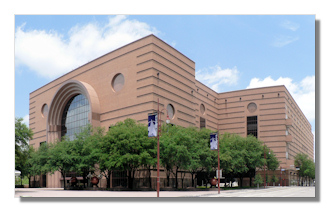
The Internet's Premier Classical Music Source
Related Links
- Latest Reviews
- More Reviews
-
By Composer
-
Collections
DVD & Blu-ray
Books
Concert Reviews
Articles/Interviews
Software
Audio
Search Amazon
Recommended Links
Site News
 Concert Review
Concert Review
Richard Wagner

Das Rheingold
- Wotan - Iain Paterson
- Loge - Stefan Margita
- Alberich - Christopher Purves
- Mime - Rodell Rosel
- Fricka - Jamie Barton
- Erda - Meredith Arwady
- Fasolt - Kristinn Sigmundsson
- Fafner - Andrea Silvestrelli
- Freia - Melody Moore
- Donner - Ryan McKinny
- Froh - Chad Shelton
- Woglinde - Andrea Carroll
- Flosshilde - Renee Tatum
- Wellgunde - Catherine Martin
Houston Grand Opera/Patrick Summers
Margaret Alkek Williams Chair
Director: Carlus Padrissa/La Fura Dels Baus
Houston, TX Wortham Theater Center, 13 April 2014
Rather than design from scratch a new production of Wagner's Ring Cycle, the Houston Grand Opera took the interesting step of outsourcing the production to the Catalan theater company La Fura dels Baus under the direction of Carlus Padrissa. Padrissa reproduces the well-documented and much-discussed Valencia Ring that debuted between 2007 and 2009 and is currently available on DVD and Blu-ray from Unitel. The hallmarks of La Fura dels Baus are the inventive and effective video projections and the use of stage acrobats. This is the group responsible for the opening ceremony of the 1992 Barcelona Olympics and they certainly have no problems with large-scale dramatic choreography.
The production has some wonderful and memorable moments. When Alberich encounters the Rhinemaidens they are each singing in individual glass tanks suspended above the stage. When he renounces love he drains the water from the tanks in a very telling gesture. The video projections for the journey into the depths of Nibelheim are the most effective representation I have yet seen of Wotan and Loge's descent and Nibelheim itself is depicted very successfully. Instead of a pile of gold we have a crowd of gold-colored dancers (crawlers?) who form a human mountain to hide Freia during the final negotiations between Wotan and the giants. And then, in the closing minutes of the drama, Froh's swinging hammer metaphorically shatters the backdrop into shards and opens up a view of Valhalla represented by a suspended cylinder of interlocking human acrobats. Heady stuff!
Yet at times the production subtly undermines what Wagner is trying to achieve. One of the characteristics of the mature Wagner is the fluidity of his dramatic writing. There are no set piece duets, arias, sextets etc. Instead there is an unbroken web of music where structure is imposed through the leitmotifs and other musical devices. In many successful productions the dynamic flow of the drama is matched by dramatic flow on the stage, with the bodily movements of the singers matching the emotional ebb and flow of the drama. Padrissa and La Fura dels Baus go in the opposite direction. For much of the drama the principals sing from cranes, with no opportunities to move anything except their arms (and rarely doing even that). The effect this creates is very static. Even though the cranes move around (steered by teams of supernumeraries) the principals are in effect talking heads and an important element of the drama is lost.
As far as the singing is concerned, the one unqualified success of the performance I heard was Christopher Purves as Alberich, who delivered a commanding performance and gave real depth to a character too often presented as a caricature. The one unqualified disappointment was Iain Paterson's Wotan. The Rheingold Wotan is not the conflicted Wotan of Die Walküre or the tragically resigned Wotan of Siegfried. But still he needs to be both magisterial and deeply ambivalent. Paterson's Wotan was neither.
The rest of the cast had some fine moments. Stefan Margita is a very experienced Loge and sang the role well (more lyrically than, for example, Graham Clark, who is even more a professional Loge). Meredith Arwady has sung Erda in Frankfurt and at the Met and her intervention was a little crude but powerful (it would have been even more powerful, I suspect, if she hadn't had to emerge from a pile of chopped wood). Jamie Barton was an adequate if undramatic Fricka. Her role deepens in Die Walküre and it will be interesting to see what she does with it next year. Andrea Silvestri (Fafner) has a very powerful basso profondo voice, but the timbre did not quite fit the role (to my ear). Kristinn Sigmundsson is a solid Fasolt. Melody Moore does not have much to do as Freia, but she can certainly project and I look forward to hearing her in more demanding Wagner soprano repertoire. Chad Shelton (Froh) and Ryan McKinny (Donner) did not disappoint, but nor did they shine.
The orchestra of the Houston Grand Opera did well at times (usually in the parts of the drama that are closest to grand opera), but gave the impression that they are still coming to terms with the demands of the score – at times they sounded rather ragged, particularly in the brass. Patrick Summers is certainly a much less well-formed Wagner conductor than Jaap van Zweden in Dallas. The Prelude, which is the seed from which the entire Ring Cycle grows, was frankly disappointing, portrayed a rather dull canal rather than the swirling depths of the Rhine. Because it is the longest unbroken piece of music in Wagner's entire oeuvre and because it does not contain any of the Ring's most memorable dramatic moments, Das Rheingold is a real test. The second half of the performance was more successful than the first, but I did not have the sense of a conductor with a clear architectural vision of what is, after all, two and a half hours of uninterrupted music.
There are many good things about this production, but also many things that need work before Die Walküre comes online in 2015.
Copyright © 2014, José Luis Bermúdez












